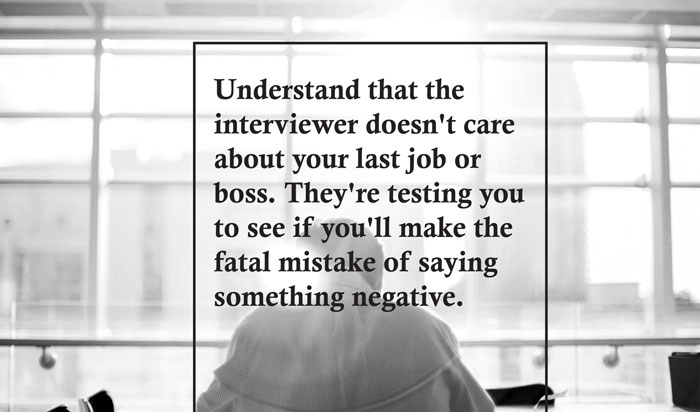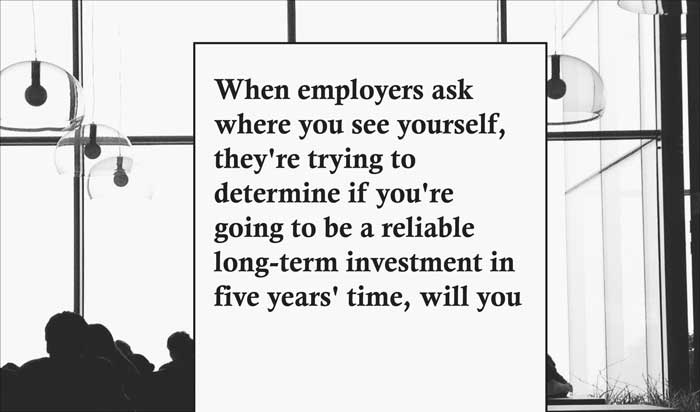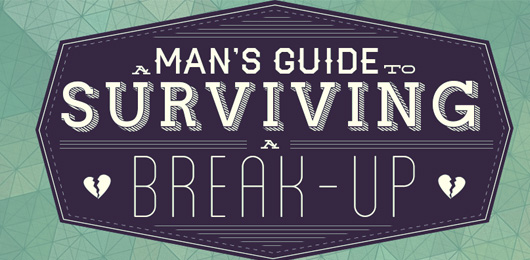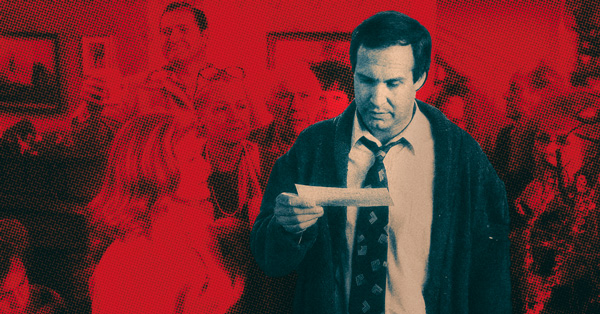Gordon Brown is a vocational case worker who helps people get back into the workforce, and has conducted mock interviews well into the triple digits.
This is it.
For weeks – months – you’ve been poring through job postings. You’ve painstakingly tweaked and refined your resume. You’ve filled out application after application and it’s finally paid off. They’ve offered you an interview – your chance to sit down and explain what makes you the best man for the job.
Now comes the hard part.
Even for seasoned professionals, the interview can be an intimidating process, and for those of us with a few years of part-time work in college, it can be downright terrifying. And while the interview is always going to be tough, with practice, preparation, and the knowledge of why you’re being asked these questions, you’ll be able to outsell people with twice the experience.
These are the seven toughest questions you’ll encounter, and the secrets to acing every single one.
“Why Do You Want To Work Here?”
The toughest part of answering this question is suppressing the urge to grab the interviewer by the shoulders and shriek “Because I need money to live, you smarmy orangutan!”
This question can be a frustrating one, especially if it’s being asked in an interview for a “survival job.” We have rent to make, bills to pay, and student loans looming over us like a tsunami made out of anxiety and despair – why else would we want to work here?
But that’s not what’s being asked.
In actuality, this question is an invitation to describe why you believe you’re a good match for the company. It’s not “what do you hope to gain from us?” but rather “what do you want to do with us?” You need to show here that you’re a fundamentally good fit – that you value the same things they do. Memorizing the company’s mission statement isn’t necessary, having a solid grasp of it is.
Sample Response: “My values and the values here at Company X are closely aligned, and I feel like I won't just fit in with the culture but excel. If I have the opportunity to join the team, I want to contribute X, Y, and Z… towards our fundamental mission.”
“What’s Your Greatest Weakness?”
Now you might think you’re prepared for this one already – hell, it might even be simple. You just hit ‘em with your best skills when it comes to your strengths and coyly slip in an obvious positive when they ask for your weakness, right?
Wrong.
As well-meaning as that tactic might be, it’s painfully outdated and detrimental advice. Don’t insult the employer’s intelligence by trotting out some cliché non-answer they’ve heard a hundred times before. “My greatest weakness is that I’m a perfectionist,” “I’m a workaholic,” “I pay too much attention to the details” – none of these do you any favors.
Don’t veer the other way either.
While it’s less common, there are folks who are far too honest about detailing their faults. They’ll confess punctuality issues, massive gaps in their knowledge, a tendency to eat their coworkers’ lunches, and so on. And they do all that without telling me what they’re doing to fix it, because that’s the secret there.
Give the employer an honest answer and immediately launch into what steps you’re taking to solve it. This model will communicate three critical things to the employer:
You Can Accurately Self Assess: Employers want workers who have a clear and critical understanding of their own skills and abilities. It’ll show the employer that your judgment is trustworthy, both in the interview and on the job.
You Take Initiative: Describing your course of action shows that you don’t need a supervisor to get on your case about fixing something – you address things on your own time and on your own dime. Self-reliance and self-sufficiency are fantastic qualities in employers regardless of the field or position.
You Can Develop: Any employer worth their salt knows that the interview isn’t about finding someone to hire, it’s about finding someone they can invest in. Your ability to develop and grow are key qualities, and potential is – as strange as it may sound – more important to employers than perfection.
Sample Response: “In the past I’ve struggled when working in large teams. As a result I’m implementing X, Y, and Z organizational techniques to avoid confusion about who to report to, etc.”
“What was the worst thing about your last job?”
Much like “what’s your greatest weakness,” this question (and the variations on it) are “trap questions” designed to get you to slip up and take yourself out of the running.
You may be tempted – sorely tempted – to exact some righteous vengeance here. You could vent about your moronic boss, your lazy, incompetent co-workers, your ungrateful clients, your impossible deadlines and how the office smelled vaguely of expired milk. Make no mistake – do that, and you might as well just get up and leave because you are not getting hired.
Understand that the interviewer doesn’t care about your last job or boss. They’re testing you to see if you’ll make the fatal mistake of saying something negative. Trash talk your last place of employment and chances are you’ll trash talk this one as well. No matter how much that hellhole of a job might deserve it don’t give in. Here’s where you can take a page out of every politician’s book and flatly deny everything…
Sample Response: “I can’t think of anything really wrong with my last job.” You’re not being dishonest here – you’re giving a coded answer to a coded question.

If you want to add a sheen of honesty you can continue, “Of course, there were opportunities for more efficiency/improvement in certain areas but that’s normal!”
Of course, that question may well lead to…
“Where Do You See Yourself In Five Years?”
The hiring process is one of the biggest expenses any business can incur. Searching for, interviewing, and onboarding new employees can be time-consuming and costly, and turnover can run into the tens of thousands of dollars. When employers ask where you see yourself, they’re trying to determine if you’re going to be a reliable long-term investment – in five years’ time, will you still be working for us?
You would be shocked at the number of people who say “no.”

As a career coach and someone involved in hiring, part of my sanity gets chipped away every time I hear someone say “I see myself running my own business” (or something along those lines) – which is really just communicating “I plan on leaving you and maybe even becoming competition.”
Other folks will stray to the other extreme and say that they have no idea where they see themselves in five years. True as that might be, all that they’re saying is that they’re either fundamentally unreliable or unfocused.
Of course, nobody knows for certain where they’re going to be in the future. Maybe some family emergency will force you to relocate. Maybe an unbelievable opportunity will present itself. Maybe the supervolcano beneath Yellowstone will finally erupt and plunge the world into an eon of darkness next Tuesday – stuff happens.
Be that as it may, you need to tell the employer what they’re looking to hear: An ambitious but reasonable estimate of where you’d be in their company within five years. Ambitious to show that you intend to be a better worker than you are now. Realistic to show that you’re not going to quit in frustration just because you haven’t been promoted after thirty days.
Explain, concretely and concisely, the ways you intend to grow as a professional in the next half-decade – what skills you’ll learn, what abilities you’ll develop.
Sample Response: “I’m definitely interested in moving up into management here, and I’ve actually already started auditing a few leadership courses online. If there’s any specialized training you do here at this company, I’d absolutely want to offer myself for that as well.”
“Give me an example of a time you…”
Granted, this isn’t so much a question as it is a prompt, but there’s not an interview out there where you won’t be asked to give an example of how you’d deal with a difficult customer, resolve a conflict with a coworker, or organize a frantically busy day. For those of you without experience, this can be particularly challenging – how on earth do you give examples for situations you’ve never been in?
Simply put – you don’t. That’s not the point here.

Though employers are always eager to find people with real-world experience, stating what you would do is what really matters to them. Can you show good judgment when the issue arises? Can you behave calmly and confidently? Can you keep the employer’s best interests in mind while still fixing the problem quickly and effectively? These are the things the interviewer is actually trying to ascertain here.
For those of us who have been in these situations, our goal should be to place emphasis on your assessment of the situation and the reasoning behind your action. Even if you don’t give a technically correct answer, showing employers why you came to that conclusion can still chalk this up as a win.
Sample Response: “I’ve actually never run into that issue – I usually get along well with everyone. What I can tell you is that if that situation were to arise, I know that our main job isn’t to hash things out in front of everyone, especially our customers. We’re all on a deadline here, so things are bound to get tense, but I’d explain that we need to get this job done first, and as soon as we’re on break, we can address the issue.”
“Why should I hire you?”
As much as this question can sound like an accusation of inadequacy, nothing could be further from the truth. When the employer asks why they should hire you, they’re giving you an invitation to talk about what makes you stand out from the crowd – the key word here being “you.”
Never mistake the interview for a test of your competence; the interview is a competition. There are a dozen other people with similar skills and work histories waiting in the lobby – what makes you different?
You could play to some unique strength – a language, knowledge of a certain program, etc. Feasible, but for folks coming out of college with limited real-world experience, that can be tough.
Fortunately, there are other options. Consider selling yourself on attitude, personality, and perspective. You could present yourself as an indomitable optimist, capable of soldiering on with a strong back and a willing spirit no matter how tough the job gets.
You could go for a cutthroat approach, telling the employer that what they need is someone who the company’s bottom line on their mind at all times. You could even use a lack of experience as a selling point, telling employers that you’ll learn to do the job exactly to their specifications. There’s a way of spinning anything – find your angle.
Sample Response: “There might be folks out there with more experience than me, but at the end of the day, you’re not going to find anyone more adaptable. That’s not a boast, that’s just the simple truth. In my last job, I wasn’t just doing my own work, I was an informal IT guy, I helped HR, I filled in for the front desk – you name it. If there’s something I can’t do, I’ve yet to find it.”
“How Many Tennis Balls Are In This Room?” (And Other Crazy Riddles)
Following Google’s example, more and more companies are incorporating brainteasers into their screening process. “Why are manhole covers round?”, “Design an evacuation plan for San Francisco,” “If you could be any superhero, who would it be?”
There is a certain Kafkaesque genius to it – these questions are designed to throw even skilled professionals off balance, giving the employer a chance to see how quickly you think on their feet and how your thought process works.
While the bizarreness of these questions can make them particularly difficult to prepare for, the best approach is to tackle these questions boldly. Fire back equally creative answers and follow them up with the all-important “…and I’m going to tell you why.”
Much like the “give me an example” prompt, your goal here is to showcase your thought process and personality. When it comes to these “behavioral” questions, a unique answer can be more correct than a “correct” answer. That said, some questions (favorite music, hobbies, etc.) should be taken at face value. The employer’s going to spend eight-plus hours a day with you – most want to know that they’ll be able to get along with you.
And this is just the beginning.
Primer's Got Your Back
It’s not enough to simply answer these questions, you have to do so with determination, poise, and unwavering confidence. Regardless of where you are in the employment process, Primer has you covered, from searching to resumes to even more expert resources on mastering the interview. You’ve got the answers, folks.
Now get to work.







![It’s Time to Begin Again: 3 Uncomfortable Frameworks That Will Make Your New Year More Meaningful [Audio Essay + Article]](https://www.primermagazine.com/wp-content/uploads/2025/01/begin_again_feature.jpg)









